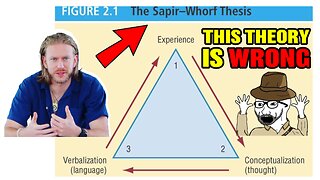Premium Only Content

The failure of Modern cultural relativism - clip from Illegitimate Scholar
This episode is with the great Stone Age Herbalist. Very excited to have him here. This is one clip from a longer episode: https://youtu.be/F4iASIOzpzs
In this video, we discuss the dangers of non-universalist moral relativism, particularly when it is applied only to Western cultures. We argue that this approach is based on the assumption that Western culture is superior to other cultures, and that it leads to a distorted view of the world.
Audio Podcast here: https://open.spotify.com/episode/3WZ4RuZEXNnXA2n7yi0NMk?si=d1b30820d1e74d17
Buy his book here, I HIGHLY recommend: https://amzn.to/3ZgpnAL
Substack: https://stoneageherbalist.substack.com/
Twitter: https://twitter.com/Paracelsus1092
We use the example of the Spanish conquest of Mexico to illustrate our point. The Aztecs were a brutal and warlike culture, but they were also a complex and sophisticated society. The Spanish conquistadors justified their invasion by claiming that they were bringing Christianity and civilization to the Aztecs. However, it is important to remember that the Aztecs were not the only culture in Central America at the time. The Mayans and Incas were also highly developed civilizations, and they were not conquered by the Spanish.
We argue that non-universalist moral relativism prevents us from making objective judgments about the actions of different cultures. If we believe that all cultures are morally equivalent, then we cannot condemn the Aztecs for their human sacrifices, or the Spanish for their conquest of Mexico. However, we believe that there are some universal moral values, such as the right to life and the right to freedom from torture. These values should apply to all cultures, regardless of their history or traditions.
We also argue that non-universalist moral relativism is intellectually dishonest. It is impossible to study the world without making any moral judgments whatsoever. Even if we try to be as objective as possible, we will still be influenced by our own values and beliefs. Therefore, we believe that it is better to be open about our moral commitments, rather than trying to pretend that we are completely neutral.
We conclude by arguing that academia should be a place where we can freely discuss all aspects of human experience, including the morally troubling ones. We should not be afraid to challenge our own assumptions and beliefs. Only then can we hope to gain a deeper understanding of the world around us.
-
 1:39:15
1:39:15
Illegitimate Scholar
3 months agoLinguistic Determinism is Wrong (Apparently)
130 -
 LIVE
LIVE
FreshandFit
4 hours agoAfter Hours w/ Mr. Organik
10,850 watching -
 2:51:01
2:51:01
TimcastIRL
6 hours agoTrump DOJ CHARGES NY Democrats, Governor For Protecting Illegal Immigrants w/Debra Lea | Timcast IRL
141K142 -
 1:25:45
1:25:45
Kim Iversen
9 hours agoIvermectin: The Hidden Treatment for Cancer They Don't Want You to Know About
84.8K104 -
 2:14:44
2:14:44
TheSaltyCracker
6 hours agoTrump Takes AXE to DC ReeEEeE Stream 02-12-25
153K206 -
 1:20:54
1:20:54
Glenn Greenwald
9 hours agoTrump, Hegseth Signal Negotiations to End Ukraine War; The Nursing Home Patients Who Run DC: With Daniel Boguslaw | SYSTEM UPDATE #406
97.5K49 -
 1:07:48
1:07:48
Man in America
9 hours agoGold Standard 2.0? The ECONOMIC EARTHQUAKE That Will Change EVERYTHING!
56.2K15 -
 2:57:15
2:57:15
I_Came_With_Fire_Podcast
8 hours agoTrump Ends Ukraine War? | FEMA Houses Migrants, Forgets Americans! | Treason In The FBI?
36.6K2 -
 1:07:44
1:07:44
Adam Does Movies
12 hours ago $4.46 earnedHow To Get A Movie Made In This New Era And Is It Worth It? - LIVE!
46.6K2 -
 55:29
55:29
Flyover Conservatives
1 day agoMEL K | We’re WINNING, But The Globalists REFUSE to Back Down—Here’s What’s Next! | FOC Show
47.7K5